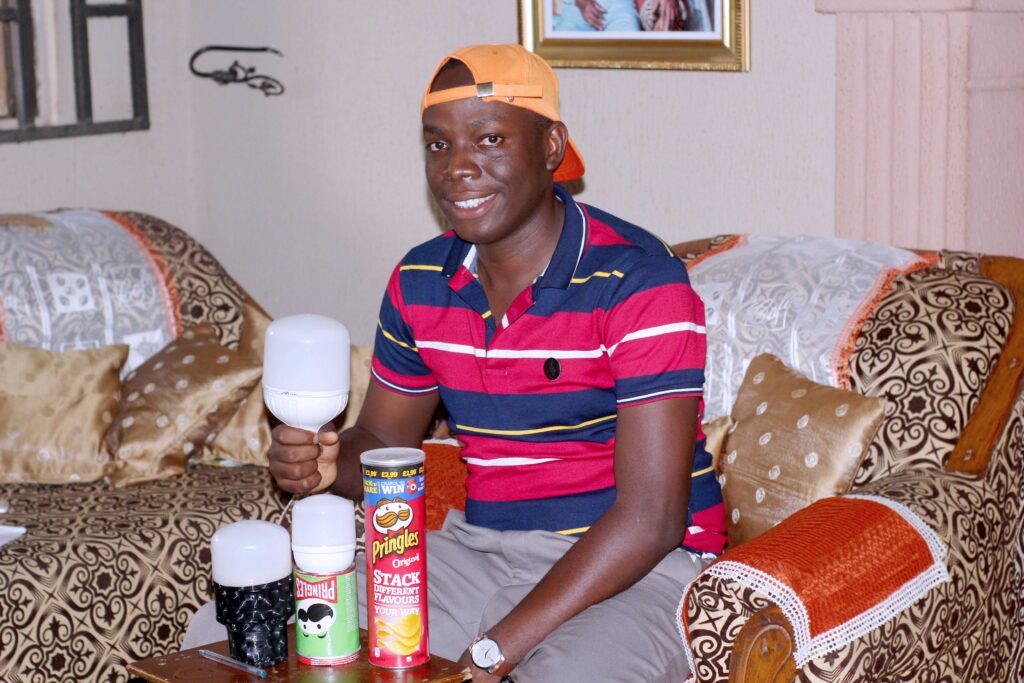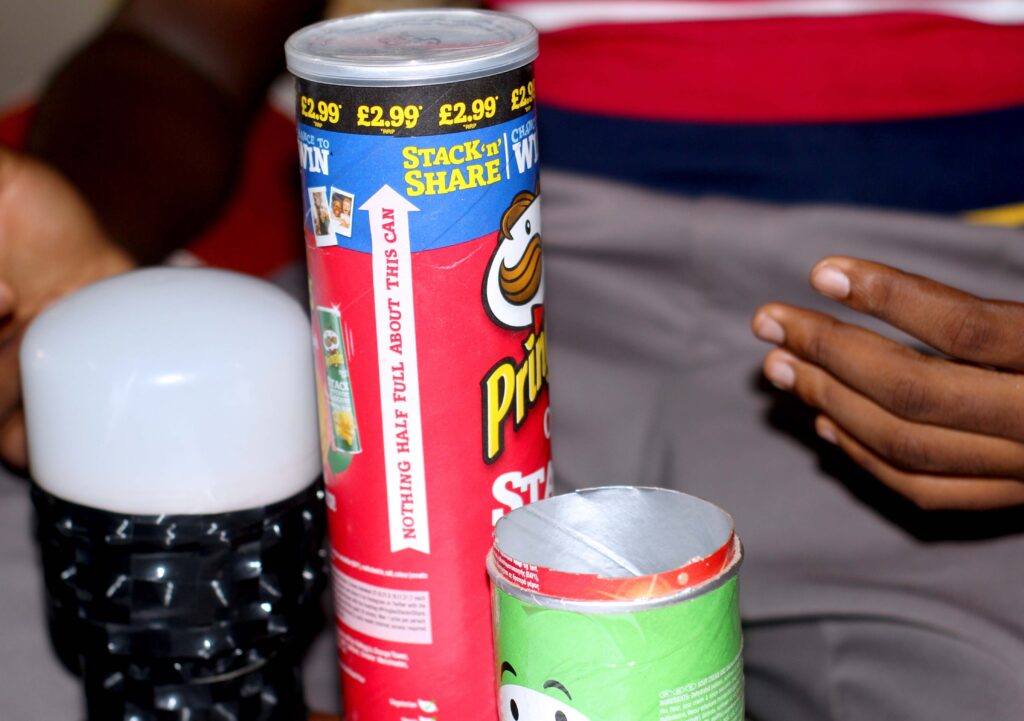The young inventor insisted on providing a tour of the surroundings. For anybody acquainted with Benin City, the prospect of a tour of the Upper Sakponba might elicit a degree of alarm. The suburb is the gateway to the informal settlement of the Idogbo community, better known as “Sin City”, an area of low-rent dwellings …
Its lighting magic so don’t toss the Pringles can

By Victor Eyike, bird story agency
“I wasn’t seeking support initially because I felt no one would readily support a grown man who litters his room with foil papers, adhesives and Pringles containers,” said Rodelenz Osarode Odemwingie, gesturing with a wry smile at the materials strewn across the room.
Speaking from a modest bungalow in Ekhator Street, Upper Sakponba, Benin City, this one-man army engaged in a war on pollution is nothing if not gracious.
“Welcome to my operation base,” said Odemwingie, who has become well known in Nigerian photographic circles for his popular light modifiers – photographic lighting equipment – that he builds from discarded Pringles cans.
The young inventor insisted on providing a tour of the surroundings. For anybody acquainted with Benin City, the prospect of a tour of the Upper Sakponba might elicit a degree of alarm. The suburb is the gateway to the informal settlement of the Idogbo community, better known as “Sin City”, an area of low-rent dwellings where law enforcement officers are unwelcome. But Odemwingie’s drive to improve environmental awareness has made him familiar to most who live in the area.
Just down the road from Nigeria’s Sin City, a young man builds lighting equipment using old Pringles cans and LED bulbs, meticulously cutting and reworking the materials. This microbiology student and environmental crusader is determined to build a brighter future in one of the region’s most notorious hotspots.
Down the street from Sin City, in a bungalow he shares with his father and which is now home to Rodelenz Industries, the 25-year-old student and part-time photographer is doing his bit to defuse the ticking bomb that is climate change.
“I noticed that plastics are a major problem in Nigeria, as well as paper waste. I also observed that people buy LED bulbs and discard them as waste after use. So, one day when I was playing around, I took a Pringles can and fitted it on a Speedlight, and I was amazed that it suited the shape of the Speedlight,” Odemwingie said, referring to a commonly used photographic flashlight.
After successfully trying out the lighting adaptor in his studio, Odemwingie began modifying more used potato chip cans. His light modifiers not only help create mood in photos but can also be used as household lighting sources.
“So I started sorting these cans and retrieving them from the environment which was being choked by the amount of waste dumped,” he added.

Odemwingie said he collects the cans and assembles them on the lawn at the back of his house. The real work takes place in his room.
“I cut them into pieces and use adhesives to stick them into a cylindrical shape and fix the foil paper on the inside. Then, I get my LED bulbs, which usually have a plastic dome, and fix them onto the empty Pringles container. This ultimately creates a simple light modifier that can be used by photographers to make their lighting softer when taking pictures,“ he explained.
LED (or, light-emitting diode) bulbs use less energy than incandescent bulbs because a diode is much more efficient, power-wise than the filament used in traditional electric light bulbs. They are estimated to save up to 75 per cent of the energy used in regular bulbs, yet provide enough power to light a wide surface area.
Odemwingie relies on his friends to assist him with referrals and to promote his work on social platforms. He is yet to go fully commercial due to a lack of capital.
“I do everything myself. I basically rely on my friends to assist me with the logistics and marketing of my products. Some of my friends lend their cars to me, especially when moving Pringles containers from a dumpsite to my workstation,” he said.
His friends, who refer to his work as “lighting magic” also help with materials, as do clients.
“At this stage, I get some of my materials from clients who know about my work outside photography. When they come to the studio, they marvelled at what I do and thereafter they reach out to me and offer LED bulbs, which I can recycle.”

Odemwingie simply smiled when asked about the genesis of his startup, recalling how he started with less than 20,000 nairas (US$ 50).
“It wasn’t expensive to kickstart the idea… and I honestly don’t regret the journey,” he said.
One of his supporters explained their support.
“I had a photo session with Odemwingie for a birthday shoot. I noticed he had a totally different model of speed light, I had never seen anything like it.
“So I quizzed him about it, and that was when I learned about his light modifier concept. The following week, my cousin had some used LED bulbs he wanted to dispose of, I called Odemwingie to come to pick it up and recycle.”
Odemwingie said he believes that everyone, both in Africa and elsewhere, has an individual and collective responsibility to keep the environment clean and safe because non-biodegradable waste materials such as plastics are not only an eyesore but a threat to “our home, the planet”.
“We need to keep our cities clean by avoiding reckless disposal of waste by residents to make them safe and habitable environments,” he said.
Odemwingie admitted to the challenges of maintaining his studies, photography and waste recycling, but he said he planned his schedule and devoted equal time to each activity.
“It’s not so difficult, especially when your work is related to your field of study. I study environmental biology and we monitor environmental conditions and conduct environmental impact assessments for development projects. That’s in line with recycling waste from the hoods and dumpsters. I cover events on Saturdays to get extra cash to fund my schooling,” he said.
He now wants to expand his network by sensitising more people, especially the youth to be environmentally-conscious and expand his business to provide jobs in the neighbourhood.
“I hope to establish a viable medium of exchange, where people can earn for every waste container they dole out for recycling. Till then, I will rely on the benevolence of my friends, clients and relatives to acquire raw materials,” he concluded.
bird story agency




